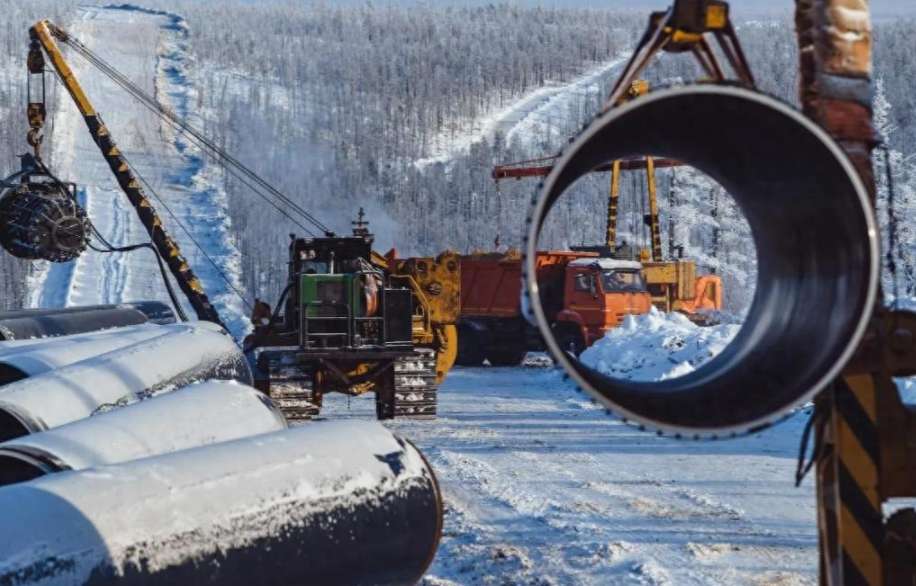Europe Bids Farewell to the "Era of Russian Gas"
Advertisements
As the dawn of 2025 breaks, Europe finds itself at the cusp of a significant transformation, one that marks the end of an era—a seismic shift in its energy landscape fueled by international tensionsThe completion of the gas transit agreement between Russia and Ukraine has set the stage for a profound discontinuity, as Gazprom, Russia's state-controlled gas company, has made the sweeping decision to terminate the transport of natural gas through Ukraine to EuropeThis abrupt cessation heralds the demise of what has been referred to as the "Russian gas era" in Europe, dismantling long-held energy dependencies and ushering in a new geopolitical landscape.
The implications of this discontinuation are far-reachingCountries that were previously reliant on transit routes across Ukraine—particularly Slovakia—are already facing a stark energy crisisSlovakia’s energy vulnerability means the nation must look elsewhere, with estimates suggesting an annual increase of 500 million to 1 billion euros in costs to import gas
The Slovak president wasted no time in attempting to mitigate the fallout by engaging in talks with Russian officials to seek solutionsYet, the anticipated spike in living costs seems inevitable and cannot be easily reversed.
Meanwhile, Germany, known for its robust manufacturing sector, publicly downplays the risks posed by this energy transitionHowever, devoid of the stable and affordable Russian gas supply, the costs of industrial production are bound to rise, thereby affecting the profit margins of its extensive manufacturing enterprisesIn recent years, there has been a noticeable trend of German companies relocating abroad in search of favorable conditions, thus raising the alarm regarding the fragility of the European economy.
While Hungary has been able to avoid the crisis by leveraging the "Turkish Stream" gas pipeline, the interconnected nature of the European energy market means that Hungary's fortunes are not insulated from the turmoil affecting its neighbors
- Korea's Central Bank Hints at Pausing Rate Cuts
- U.S. Stocks Decline Across the Board
- Embrace Long-Term Perspectives on Returns
- Surge in U.S. Tech Stocks!
- Institutional Research on Industry and Stock Ratings
Increased energy costs across the region will inevitably trickle down, resulting in higher living expenses and further burdens on the industrial sector.
On the surface, cutting off gas supplies presents itself as a tactic for Ukraine to confront Russian aggressionHowever, this strategy has come at a staggering costUkraine stands to lose approximately 800 million dollars annually in transit fees alone, not to mention the challenges posed by diminished access to affordable Russian gas, exacerbating its existing energy problemsThis, in essence, reveals a conflict that benefits no one involved.
The shifting energy dynamics have also positioned the United States as a major player on the global stageSince the escalation of the conflict, the U.Shas emerged as the world’s largest exporter of liquefied natural gas (LNG), with imports from the U.Saccounting for 46% of the EU's total LNG acquisitions in 2023. The profit margins for American energy firms are substantial, with each LNG shipment to Europe generating an excess of $150 million in revenue, feeding into the narrative of the U.S
reaping the rewards of a rapidly changing energy market.
Despite the long-term goal of reducing dependence on Russian gas, Europe's shift towards a diversified portfolio involving renewable energy and LNG imports is not without costly adjustmentsThe construction of multiple LNG terminals and receiving facilities across Europe has come at a significant financial investmentFor instance, Germany has spent tens of billions of euros on three new terminals scheduled to open in 2024. Moreover, compared to domestic Russian gas, the price of U.SLNG is notably higher due to increased transportation costs, which poses a threat to both industrial competitiveness and household affordability across Europe.
The change in the energy supply landscape also magnifies the geopolitical rift, leading Europe to further align itself with the United States against RussiaThe dissolution of Russian gas dominance has compelled Moscow to pivot its focus towards the Asian market

Recent agreements between Russia and China have seen the capacity of the “Power of Siberia” pipeline increase significantly, aiming to deliver 38 billion cubic meters of gas annually to China beginning in 2025. Pressures have accelerated these developments ahead of schedule, signaling a new chapter of energy cooperation between Russia and its eastern neighbor.
The termination of gas supplies to Europe from Russia may result in short-term losses but accentuates the urgency of deepening collaboration with Asian marketsThese moves symbolize not just a shift in energy sources but a broader strategic recalibration that could reverberate throughout global energy dynamicsWhile the U.Semerges as the primary beneficiary, the long-term consequences may present a concerning picture for European nations facing skyrocketing gas prices that impact the cost of living and heighten inflationary pressures.
In the wake of this energy disruption, Europe is unlikely to achieve energy autonomy without facing significant hurdles, including high costs and technical challenges
The concept of energy independence remains a lofty goal, hampered by the practicalities of dependence on external suppliers and fluctuating marketsAs American LNG continues to dominate the European energy landscape, it raises questions about the long-term implications of such reliance on a single supplier, particularly when escalations in prices could foster discontent among European allies.
In conclusion, the new energy paradigm illustrates a complex interplay of winners and losersThe United States has seized the opportunity to secure its position as a global energy powerhouse, while European nations grapple with the consequences of this transitionAs energy markets evolve, the focus will increasingly shift towards sustainable policies and innovative solutions, yet the path forward will require cohesive plans and joint efforts amongst European countries to navigate the risks inherent in their newfound energy affiliations.
Post Comment